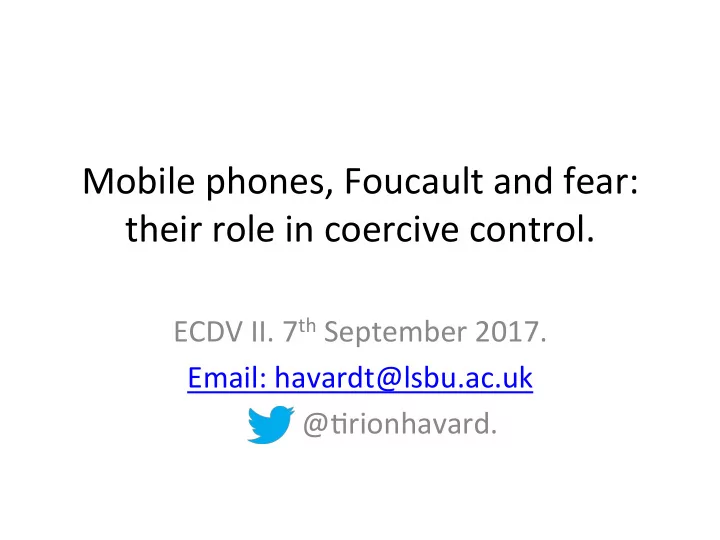

Mobile phones, Foucault and fear: their role in coercive control. ECDV II. 7 th September 2017. Email: havardt@lsbu.ac.uk @Erionhavard.
Current and ongoing research. • Currently studying for a Doctorate in Social Work at The University of Sussex. • Women survivors currently housed in refuges. • Using grounded theory to analyse the data • Interviewing alongside analysis. • Names changed to conceal idenEty.
How are mobile phones used? • To insEgate physical violence: violence to gain access to the phone, violence/threat of violence about what they find on the phone. • To monitor: GPS tracking, Video calling, checking phone. • To inEmidate: threats via text/Facebook etc • To isolate: bombard friends with texts/phone calls; monitor access to mobile phone/‘brick phone’ = controlling the woman, who she sees, where she goes, what she does.
Joanna 30s. • “Happiness comes with freedom, if I am locked up in a cell am I going to be happy? No. That’s how it feels, it feels like you’re….you’re locked up. You feel there’s no freedom even when you’re out. You feel like you are locked up somewhere, you don’t have freedom, someone is controlling you.”
Bentham’s PanopEcon • . In the centre of a prison, there is a guard tower where all the prisoners are axially visible and can be observed at all Emes. The walls between each cell separate the prisoners, prevenEng lateral visibility and ensuring isolaEon from other inmates. Thus the prisoners are only able to see the guard tower, which serves as a constant reminder that they are permanently being watched and monitored
• “to induce in the inmate a state of conscious and permanent visibility that assures the automaEc funcEoning of power, so ……that the surveillance is permanent in its effects, even if it is discon5nuous in its ac5on ; that the perfecEon of power should tend to render its actual exercise unnecessary…..” • Foucault 1991 p201.
Permanent in its effects? • “You already have a camera on your FaceEme, you have a camera on your what's app, …….all social media is having camera. Of course, so how am I supposed to be free?” Joanna 30s • “It’s really hard…..to like…….hide yourself basically, so he could do anything, he could put a picture to say I’m missing and then people will start ringing his phone saying “oh I saw her here, I saw her there”. Katherine 20s • “I put Essue (Essue is covering the lens of the camera). I don’t know but in my mind I think maybe he can see over the….. I know, it is a sickness, but I put it and I glue it so he can’t see”. Donna 30s
Foucault 1991 • The inmate only needs to think that they are being watched in order for behaviour to change and for compliance to be achieved. • That person’s behaviour will change as they begin to assume responsibility for their own surveillance. • Introduces the concept of discipline, a quiet, slow, almost invisible force of power. • This constant threat of unpredictable surveillance culEvates a parEcular form of self; individuals watch themselves because of the uncertainty of whether or not they are being watched by others
Coercive Control. Stark 2007. • "coercive control entails a malevolent course of conduct that subordinates women to an alien will by violaEng their physical integrity (domesEc violence), denying them respect and autonomy ( inEmidaEon), depriving them of social connectedness (isolaEon) and appropriaEng or denying them access to the resources required for personhood and ciEzenship (control)” ( p15). • Hidden within plain sight. • Likens it to being confined in a jail cell or an invisible cage.
Alien Will? • “…I sit in car. And say nothing and when I call he say I not be at home I be outside and special [deliberately] not answer. …….. because I want to show him, but he not answer, …. and I sending videos everything and I don’t know how to explain”. Francesca 20s • “I wouldn’t go places, because I know he would find…. If I went to meet somebody me…if I turned the locaEon off he would know where I am, he would track my phone.” Suzie 50’s
Foucault, Fear and mobile phones. • Is the mobile phone taking on the role of the guard in the watchtower? • The digital age means that there is no need for the controlled space to be a physical environment and the boundaries of disciplined society no longer lie within or behind bricks and mortar. • Unlike patriarchy, the power is horizontal, not hierarchical and it is difficult to know where it is coming from and harder sEll to know how to get out from under it. • When working with/trying to understand ‘modern’ domesEc violence, is the feminist explanaEon sufficient? •
• any thoughts, ideas or • If you want to quesEons? contact me; • Email: havardt@lsbu.ac.uk • @Erionhavard.
References • Foucault (1991) Crime and punishment: the birth of the prison . Penguin. London. • Johnson, M.P. & Ferraro, K.J., (2000). Research on domesEc violence in the 1990s : Making disEncEons. Journal of Marriage and the Family , 62, pp.948–963. • Stark E. (2007) Coercive control: how men entrap women in personal life . New york. Oxford university press.
Recommend
More recommend